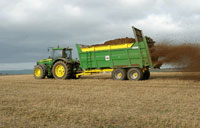Study into cutting farmland nitrous oxide emissions

Chemicals that could significantly reduce nitrous oxide emissions from farmland are to be the subject of a study.
Nitrous oxide, commonly known as laughing gas, is about 300 times more potent than carbon dioxide. It is mainly produced from applied nitrogen fertilisers, manure and depositions from grazing livestock and accounts for 53% of UK agriculture’s greenhouse gas emissions.
Nitrification Inhibitors are chemicals that slow the conversion of ammonium in artificial and natural fertilisers to nitrous oxide and could play a significant role in reducing emissions.
The four-year ADAS and North Wyke Research study will assess the efficacy of these chemicals, says Brian Chambers, head of science in ADAS’ Environment Group.
“The idea behind the project, which began in spring, is to see whether it will be possible to use NIs to reduce N2O from fertiliser and manure applications to land and grazing deposits”.
The study will also look at the role that improved nutrient management and timing of fertiliser and manures will have on N2O emissions, he adds.
Similar research conducted in New Zealand concluded there was potential to reduce N2O production by up to 90%. “New Zealand shares a number of similarities with the UK in terms of accepted agricultural practices. However, the climate and soils are markedly different, so we have to make sure NI use is sustainable and above all safe to carry out in the UK.”
The study, commissioned by Defra is expected to be completed by 2014. It is the first time large-scale field studies using nitrification inhibitors have been undertaken in the UK. Defra will use the results to further develop its GHG reduction strategies for farming.
